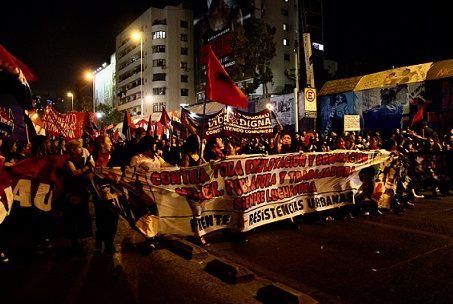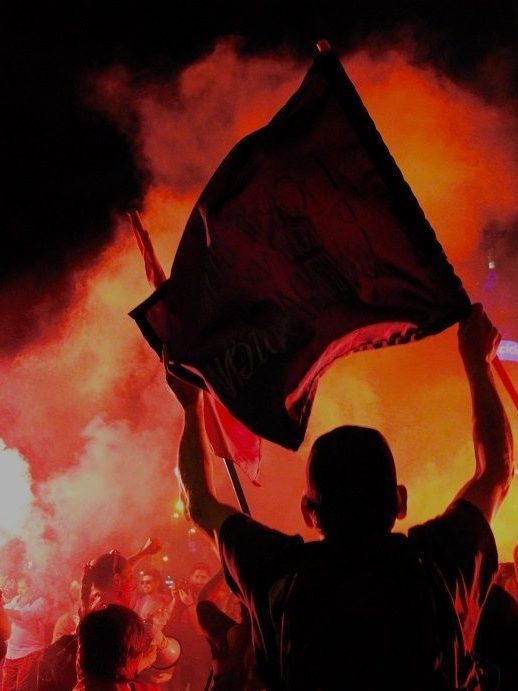The social movement led by the students shaking Chile is described as the start of a new era for this nation, which is still recovering from one of the cruelest military dictatorships on the continent.
 Raimundo López
Raimundo López
Karol Cariola is one of the protest leaders. She is small, beautiful, has a strong voice and a maturity of thought and ideas uncommon in those who have hardly reached the magical age of 20.
She is the General Secretary of the youth wing of the Communist Party of Chile and President of the University of Concepción Student Federation for two years. Karol Cariola travelled to El Salvador together with Camila Donato, President of the Federation of Pedagogy Students at the Metropolitan University of Santiago de Chile. On 18 January, they were invited to present two books in the Our America Cultural Centre.
She wrote the prologue of the first text which is about the youth of leaders including Fidel Castro, Ernesto Che Guevara, Salvador Allende, Pablo Neruda and Gladys Marín. The second text, “We can change the world”, was written by Camila Vallejo, one of the main leaders of the movement.
Karol, together with Camila Donato, records conversations with Prensa Latina (Latin Press) concerning the student fight against the neoliberal ideal imposed by the dictatorship which through terror made education and health into a market offering a variety of choices for the rich and discriminated against the poor.
This is a movement which has been growing for many years, it is somehow stronger in 2011, taking on a different momentum, and has managed to revive a process which was already being developed.
“In 2005, the student movement generated a process, – unlike that of 2011 – when it did not manage a coherent and national unity, but in 2006 it had concrete repercussions, when the secondary students, the “penguins”, made the so-called penguin “call” (the Penguinazo), no longer questioning the ideal in educational terms from an economic perspective only, but also from a more structural perspective”, she says.
Following that it managed to change the Constitutional Organic Law of Education, signed by Pinochet the day before his dictatorship ended.
“Perhaps one of the clearest and most concrete characteristics regarding the slant, the discrimination generated by public education and its lack of quality, is that only 17% of students graduating from public education succeed in going on to university or another form of public higher education.
The rest have to consider what options they have left, for example, private education which is extremely expensive”, she says.
“The Neoliberal economic and social ideal is based on exclusion, inequality and the deepening of this inequality. It is one of the main reasons why in this country, these contradictions occur in such an absurd and definite manner”.
“Even today, we wear the straitjackets which have not allowed the Chilean people to wake up from the oppression, from the submission which the dictatorship bestowed upon us more than 40 years ago”.
Karol tells how, luckily, in 2009, the student movement developed a National Conference on Education, which “has managed to involve teachers, academics, parents and guardians, secondary students, and all stakeholders involved in education”.
 She describes how this was the start of what was to come later. They thought in 2010 that the social movement, the student movement in particular, would have a greater impact but unfortunately, the country was hit by an earthquake.
She describes how this was the start of what was to come later. They thought in 2010 that the social movement, the student movement in particular, would have a greater impact but unfortunately, the country was hit by an earthquake.
At the time, Karol was President of the University of Concepción Student Federation and remembers that the movement answered the immediate call for help from victims of the devastating earthquake.
They needed a practical, fast and flexible response and the government was not able to provide it, she said. “The organisation of the student movement, from voluntary groups which emerged from Arica to Punta Arenas, the two extremes of the country, to move to the affected regions, was a demonstration of strength, of unity, of collective work, which profoundly marked the way the student movement was organised in 2011”. Karol points out that first to be put on the table were deeper structural questions, and no longer only economic plans. “The need to reform the Chilean education system was discussed from the perspective of access to higher education, of funding not only for institutions but also for students, offering free education from the perspective of democratisation, on the understanding that universities like institutions must serve the people and the development of the country”.
“As I said, the movement has managed to grow because of these characteristics of implementing a much deeper appeal, and it also succeeds in developing unity”.
“And in some way or another, the Chilean people have managed to wake up from submission, from the numbness of years of exploitation, intended or not and nowadays, citizens no longer accept that education is a commodity, that health is about making a profit in the way that it does, that hospitals are no longer franchised only in their construction, but also in their administration”, she condemns. She describes it as a type of curse. “I believe that the economic neoliberal ideal is a curse not only in Latin America, but a curse that capitalism has implemented on our continent”.
“Fortunately nowadays, the power that this ideal had is seen to be damaged and this is exactly why we say we are starting a new Spring, a new Spring for the Chilean people”.
In this sense it evokes the government of the People’s Unity and Salvador Allende, in that the people of Chile also had a very similar state of consciousness at that time.
“Without a doubt, she explains, this is the moment, also within the context of the global economic crisis, when our people must liberate themselves, they must free themselves of the straitjackets that the dictatorship bestowed upon us and which continue to weigh us down”.
“Fortunately, we now have an impetuous, rebellious, revolutionary and thirsty youth ready to bring about change without fear, which is very important because the youth and the previous generation was a frightened generation, terrified by the bloody dictatorship in which we lived for so many years”.
“Our generation is free from that fear, free from the paralysing terror which for many years kept our people asleep, quiet and without the possibility of self-organisation and growth”, she points out.
She adds, “This is what happened in 2011, when not only students but also the people, the workers, the housewives, boys, girls, everyone together, went out on the streets to demonstrate, each person in his own way”.
“I see a new hope for the future of my homeland”, she explains. “I see a bright future and I believe that nowadays, we have the opportunity to take advantage of this awakening, of this new state of consciousness, to take advantage of this leadership crisis of neoliberalism, as well as building a new force which must enhance the processes of liberation, democratic progress – revolutionary processes that are occurring throughout our Latin America”.












.jpg)












